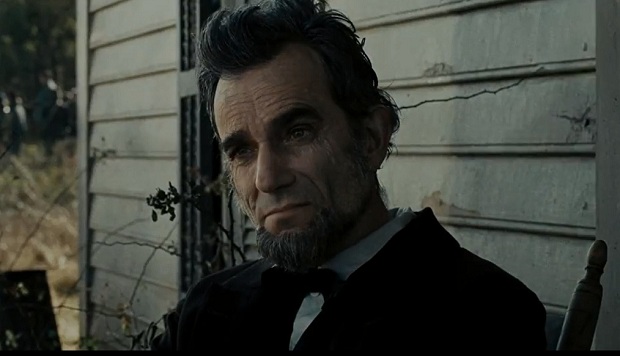
Except for authorial description, there is no evidence of how Abraham Lincoln sounded. There is no visual evidence of how he walked or plodded. But, Daniel Day Lewis’ incomparable portrayal of the 16th president feels more real than any description I’ve ever read. His body is restrained by his own arms that find themselves under the umbrella of shoulders tasked with carrying the weight of a country. They arch concavely under a head so filled with knowledge, he can hardly help but speak with casual references to Euclid and Plato. Lincoln is himself a tragic figure, his passion suffocated by a gentle voice that suggests meekness and mildness unprepared for the tumult of politics. But his heavy hands and feet speak in volumes about the frustration that wells underneath when his voice – enraged – fails to notch a decibel above the loudest sotto.
Lewis gives Lincoln life and brings relevance to a film that is otherwise creaky.
In its best moments, it sheds light on the controversy surrounding the Emancipation Proclamation and reminds us that Lincoln originally freed slaves 1) that he didn’t have because they were part of the seceded South 2) freed slaves for militaristic purposes, not as a benevolent manumission.
Lincoln, the film, becomes a microcosm of contemporary government, wherein upholding party lines become the end-all-be-all of voting for or against bills. We don’t need a discussion of today’s legislature, but in 1865, Lincoln’s concern was that his Republican party was “20 votes short” of passing the 13th Amendment – the one that abolishes slavery, one that was being blocked by the Democrats, it seems for the most part, simply because they were Democrats and Lincoln was a Republican, leading them to “stiffen if anything” after Lincoln’s second election. Whether or not this is coincidence, it’s difficult not to draw comparisons between the Romney camp and Obama camp – or, the Obama camp and the McCain camp from four years ago.
We are also reminded of how politics work. One-hundred percent benevolent acts hardly exist. More often, there is a mutual exchange of services. Votes are gained, at times, through “patronage jobs for those who vote ‘yes’.” The debate over whether or not politicians are elected to lead or to represent is present throughout, as is the categorization of voters into percentages. Like Romney’s “47 percent” flub that conceded those people who will always vote for Obama no matter what, Thaddeus Stevens (Tommy Lee Jones) notes that the Republicans have “abandoned these 39%” who are destined to vote against the amendment. They are a lost cause, so Lincoln and his brood must look elsewhere for support.
And, look he does for most of the film, which is a testament to a quality biopic – one that focuses on a portion of the subject’s life, until the penultimate end injects the all-too familiar assassination of Lincoln. We know it’s coming, and Spielberg handles it well by eliding the action, Booth’s face, and the action-movie-motif that unfurls the assassination in Ford’s theater. We are told when his son is told – at another theater. And then we see him pass. And then we see him speaking to an audience about equality and tolerance.
And then I wondered why I needed to be reminded that he was killed. The passage of the 13th Amendment is not directly related to his assassination. His policies during the war perhaps. His rumored dictatorship, sure, but the 13th Amendment – which seems to be the meat of the narrative – was not. If Lincoln’s death is to show how much he gave for the abolition of slavery, I’m not sure if I completely buy this. The idea is strongly suggested when Lincoln is told that he looks “ten years older than he did a year ago.” This reminds us of the toll that the presidency takes on its placeholder.
What this awkward correlation between success and death effectively does is dilute the power of the film with an additional twenty minutes. Truthfully, the strongest way to end the film would have been the close up on Steven’s face as he lay in bed with his wife after the amendment’s passage. If more was needed, it could have ended outside of Appomattox Court House.
Often, Lincoln feels like a stage play with melodramatic exposition and stiff-legged entrances and exits – none more so that when we meet Lincoln’s son Bob (Joseph Gordon Levitt) for the first time – or perhaps when Abe and Molly (Sally Field) argue about his threat to lock her in the “nut house.” I suppose this makes him human and a man tasked with personal as well as national turmoil, but it feels more forced than necessary, just in case we didn’t previously comprehend the gravity of his position.
In the end, Lincoln does many things well, something that should be expected from both this cast and from Spielberg. At the same time, it falls prey to the latter’s need to overemphasize metaphors.





